Personal Statement for McGill University | Sample SOP/Essay
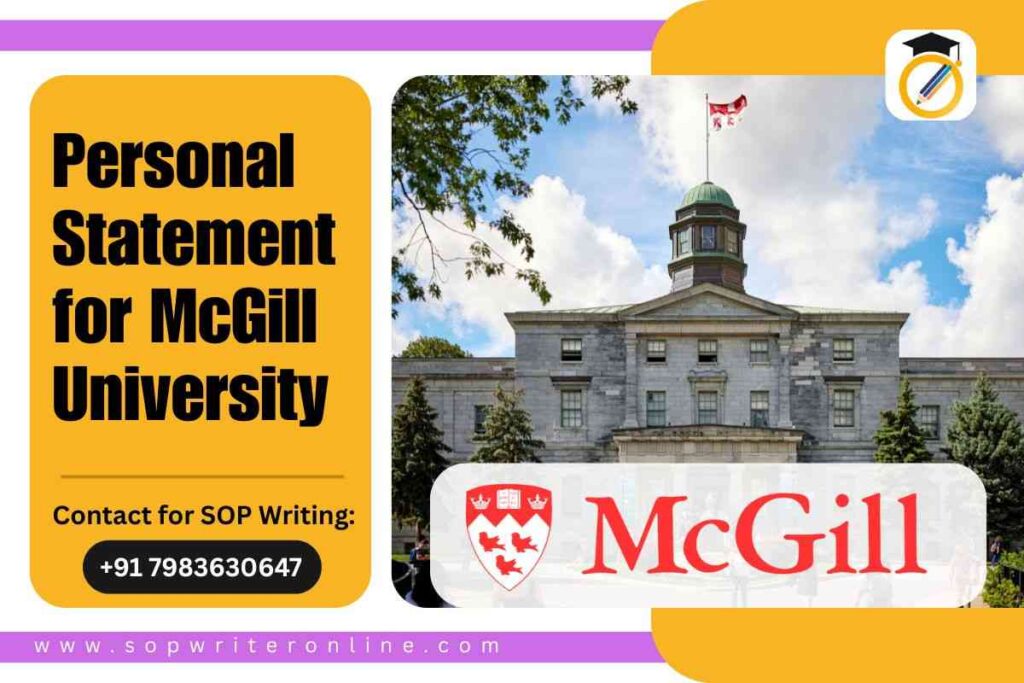
When you start drafting an SOP or a Personal Statement for McGill University, It is looking for more than just high academic scores; they seek students who demonstrate intellectual curiosity, clear goals, and a strong fit with their program and community. The personal statement (or supplementary essays) is your student’s opportunity to tell their unique story.
SOP Writing Assistance: What’s App us +91 7983630647
1. Understand the Context: Is a Statement Required?
It is crucial to verify if a personal statement is required for the specific program the student is applying to.
- Most Programs (Direct Admission): For many faculties (like Arts, Science, and most Engineering), admission is primarily based on academic record. A personal statement is not required unless the student is applying for a specific scholarship (e.g., Major Entrance Scholarships or McCall MacBain) or claiming “Extenuating Circumstances.”
- Programs that Typically Require a Statement: Certain faculties require supplemental documents and essays, often addressing specific prompts. These typically include:
- Law (BCL/JD)
- Nursing
- Social Work
- Education
- Dietetics
- Global Engineering
- Kinesiology
2. Core Principles for a Strong McGill Essay
Whether it’s a short 200-word essay or a 500-word statement, the following principles should govern the content:
| Principle | Description | What to Avoid |
|---|---|---|
| Specific & Concrete | Every claim must be backed up by a specific, detailed anecdote or example. Don’t just say you are a leader; describe a time you led a team to achieve a goal. | Generalities, vague descriptions, or listing achievements without context. |
| Forward-Looking | Connect past achievements and experiences directly to the future. Show how the specific McGill program is the only logical next step to achieve their long-term professional or academic goals. | Dwelling too much on high school successes that don’t relate to their desired field of study. |
| Program Fit (The “Why McGill?”) | Demonstrate specific knowledge of the faculty, courses, research centers, or culture at McGill. Mentioning a specific professor or a unique research initiative in the department is powerful. | Generic praise like “McGill is a great school” or “I love the city of Montreal.” |
| Show, Don’t Tell | Focus on actions, dialogue, and reflection. Instead of stating “I am resilient,” describe a significant challenge, the process of overcoming it, and the resulting growth. | Using overly dramatic or cliché language (“Since I was a child…”). |
| Be Authentic and Reflective | The tone should sound like the student, not a textbook. Admissions committees look for self-awareness and insight—the “so what” behind the experience. What did they learn? How did it change their perspective? | Sounding arrogant, using filler words to reach a word count, or reciting a CV. |
3. Deconstructing Common Essay Themes
McGill’s essays often focus on a few key areas, particularly for competitive admissions and scholarships:
A. The “Why This Program, Why Now?” Essay
- Goal: To prove the student is highly motivated, has researched the field, and has clear academic/career objectives.
- Structure:
- Origin: A brief, specific moment or realization that sparked their intellectual interest in the field (e.g., reading a specific paper, volunteering, a class project).
- Preparation: How their academic or extracurricular background has prepared them for the rigor of the program.
- The Fit (Crucial): Identify three to four specific, unique components of the McGill program (e.g., the Global Health concentration, the particular Law curriculum, a specific research lab) that are essential for their future goals.
- Future Vision: A concise statement of their mid-term and long-term professional aspirations, clearly stating how the degree will get them there.
B. The Leadership/Community Essay
- Goal: To assess maturity, judgment, ability to work with others, and impact outside of the classroom.
- Structure (STAR Method is great here):
- S (Situation) & T (Task): Briefly set the scene—describe the challenge or goal of the team/community activity.
- A (Action): Describe their specific actions. Focus on how they led (did they delegate, resolve conflict, motivate, organize, or innovate?). Use “I” statements, not “we.”
- R (Result) & Reflection: State the tangible result, and most importantly, what they learned about themselves or leadership from the experience. Did they make a mistake? What would they do differently?
C. The Extenuating Circumstances Statement
- Goal: To provide context for a temporary dip in academic performance.
- Tone: Professional, objective, and factual.
- Content:
- Nature & Chronology: State the circumstance (e.g., significant illness, family crisis) and the precise time period it affected them.
- Impact: Clearly state the direct impact on their academic record (e.g., “This resulted in a drop from an A average to a B- in the second semester of Grade 11.”).
- Resolution & Recovery: Demonstrate resilience by showing how their performance improved after the circumstances were resolved. This is critical to prove readiness for university-level work. Do not use this space to plead or seek sympathy.
4. Final Review Checklist
Before submission, a student should answer ‘Yes’ to all of the following:
- Is the essay entirely within the word or page limit?
- Does the essay answer the prompt directly and fully?
- Are there specific examples for every major claim?
- Do I mention at least one specific, unique aspect of the McGill program?
- Is the writing clear, concise, and free of grammatical errors?
- Does the essay sound authentic—like the student’s actual voice?
- Does the essay demonstrate self-awareness or growth (the “so what”)?
What McGill ask for? a Personal Statement/SOP/Essay
For your undergraduate students, here is the breakdown of what they should expect to write:
Undergraduate Admissions (What to Expect)
| Program Type | Term Used | Purpose & Format |
| Most Undergraduate Programs (Arts, Science, Management, most Engineering) | None (or Short Answer Questions) | No Personal Statement (SOP or Essay) is typically required. Admission is almost entirely based on academic grades. The application may include brief, short-answer questions (e.g., 105 character max) about extracurricular activities or interests, but these are not full essays. |
| Programs Requiring Additional Review (e.g., Law, Global Engineering, Nursing, Social Work, Education) | Personal Statement or Supporting Documents/Essays | These are required essays that address specific prompts related to the program. For example, the Bachelor of Global Engineering requires a 1-2 page Personal Statement detailing motivations, goals, and alignment with the program. They are essentially program-specific essays. |
| Scholarships (e.g., Major Entrance Scholarships, McCall MacBain) | Essay or Short-Answer Responses | These sections involve multiple short essays or reflections on leadership, community involvement, overcoming challenges, or future goals. These are often the most demanding writing components. |
| Graduate Admissions | Statement of Purpose (SOP) | This is primarily a graduate school term used to explain academic background, research interests, and program fit for Master’s or PhD applications. Your undergraduate students will rarely see this term. |
In short:
Graduate Level: They need a Statement of Purpose (SOP).
Undergraduate (Most): No statement required.
Undergraduate (Specific/Scholarship): They need to write a Personal Statement or Essay tailored to the prompt.
SOP Writing Assistance: What’s App us +91 7983630647
🌟 Why We’re the Best Choice for Your McGill University Personal Statement

Writing a personal statement for McGill University requires more than good grammar — it needs a clear story that highlights your goals, achievements, and alignment with McGill’s academic values. That’s exactly what we specialize in at www.sopwriteronline.com
Our team of expert writers understands what Canadian universities like McGill expect in a strong personal statement. With years of experience helping students secure admissions to top universities worldwide, we ensure:
- ✍️ Original & plagiarism-free content written from scratch
- 🎓 University-specific customization to match McGill’s standards
- 🕐 Quick delivery without compromising quality
- 🔁 Unlimited revisions until you’re 100% satisfied
- 💬 One-on-one writer support to bring out your unique story
Whether you’re applying for undergraduate or graduate programs, our personalized SOP writing service guarantees a statement that makes you stand out.
📞 Contact us today:
🌐 Visit: www.sopwriteronline.com
SOP Writing Assistance: What’s App us +91 7983630647
Available Programs at McGill University: UG, Masters, and PhD
McGill University is a world-renowned Canadian institution offering over 300 undergraduate (UG) and 400 postgraduate (Masters and PhD) programs across various disciplines and specializations. The table below lists the major fields of study, along with the typical duration for each program level. Please note that the specific duration may vary slightly depending on the individual program, especially for thesis-based or research degrees.
| Program/Faculty | Degree Offered | Typical Duration (Non-CEGEP Entry) | Primary Focus of Supplemental Essay(s) |
| Law (Integrated Program) | BCL/JD (Bachelor of Civil Law/Juris Doctor) | 3.5 to 4 Years (105 credits) | Legal pluralism, interdisciplinary interests, and commitment to justice. |
| Nursing | BScN (Bachelor of Science in Nursing) | 4 Years | Motivation for the profession, relevant experience, and self-reflection. |
| Social Work | BSW (Bachelor of Social Work) | 4 Years | Commitment to social justice, equity issues, and community work. |
| Education | BEd (Bachelor of Education) | 4 Years | Passion for teaching, experience with youth/mentorship, and pedagogical theory. |
| Dietetics | BSc (Nutr.Sc.) (Nutritional Sciences) | 4 Years | Interest in human nutrition and health, specific career goals (e.g., Registered Dietitian). |
| Global Engineering | BEng (Bachelor of Engineering) | 4 Years | Addressing global challenges, international perspective, and project involvement. |
| Kinesiology | BSc (Kinesiology) | 4 Years | Interest in human movement and health science, and career direction. |
Major Programs and Their Duration
| Program Level | Popular Faculties / Programs | Degree Type | Estimated Duration |
|---|---|---|---|
| Undergraduate (UG) | Arts, Science, Engineering, Management (BCom), Education, Law (BCL/JD – Integrated), Health Sciences | BA, BSc, BEng, BCom, BEd, BCL/JD | 3 to 4 years |
| Masters (PG) | Computer Science, Management (MBA, MM Finance), Civil/Mechanical Engineering (M.Eng), Arts (MA), Information Studies, Public Health | MA, MSc, MEng, MBA, LLM | 1 to 2 years (up to 3 years for research-heavy programs) |
| Doctoral (PhD) | Management, Computer Science, Biology, Educational Studies, many other research fields | PhD (Doctor of Philosophy) | 3 to 5 years |
Please Note:
- UG Duration: Generally 4 years for non-CEGEP applicants. The integrated Law (BCL/JD) program typically takes around 3.5 to 4 years. (Note: The duration is 3 years for Quebec CEGEP students.)
- PG Duration: Most course-based Master’s degrees take 12 to 18 months, while thesis-based Master’s degrees (M.Sc.) can take 2 years or more.
- PhD Duration: Full-time PhD programs require a minimum of 3 to 4 years of study, but are commonly completed in 5 years.
Frequently Asked Questions (FAQs)
📝 FAQs on Personal Statement for McGill University
1. What should I include in my Personal Statement for McGill University?
Your personal statement should cover your academic background, career goals, motivation for choosing McGill, relevant experiences, and how the program aligns with your aspirations. Be concise, clear, and authentic.
2. How long should the McGill personal statement be?
Most McGill programs expect a personal statement of 500–1000 words, but it’s best to check the specific department’s requirements before writing.
3. Can I use the same personal statement for other Canadian universities?
It’s not recommended. Each university, including McGill, values personalization. Tailor your statement to reflect McGill’s unique strengths, faculty, and course structure.
4. What mistakes should I avoid in my McGill personal statement?
Avoid generic content, overused quotes, grammatical errors, and copying online samples. Always keep your focus on your personal journey and connection with McGill.
5. Can professionals help me write my Personal Statement for McGill University?
Yes, hiring expert writers ensures your statement is structured, plagiarism-free, and aligned with McGill’s admission standards. Agencies like sopwriteronline.com
Also Read: SOP for University of South Wales! | Personal Statement for Deakin University | Study in Canada
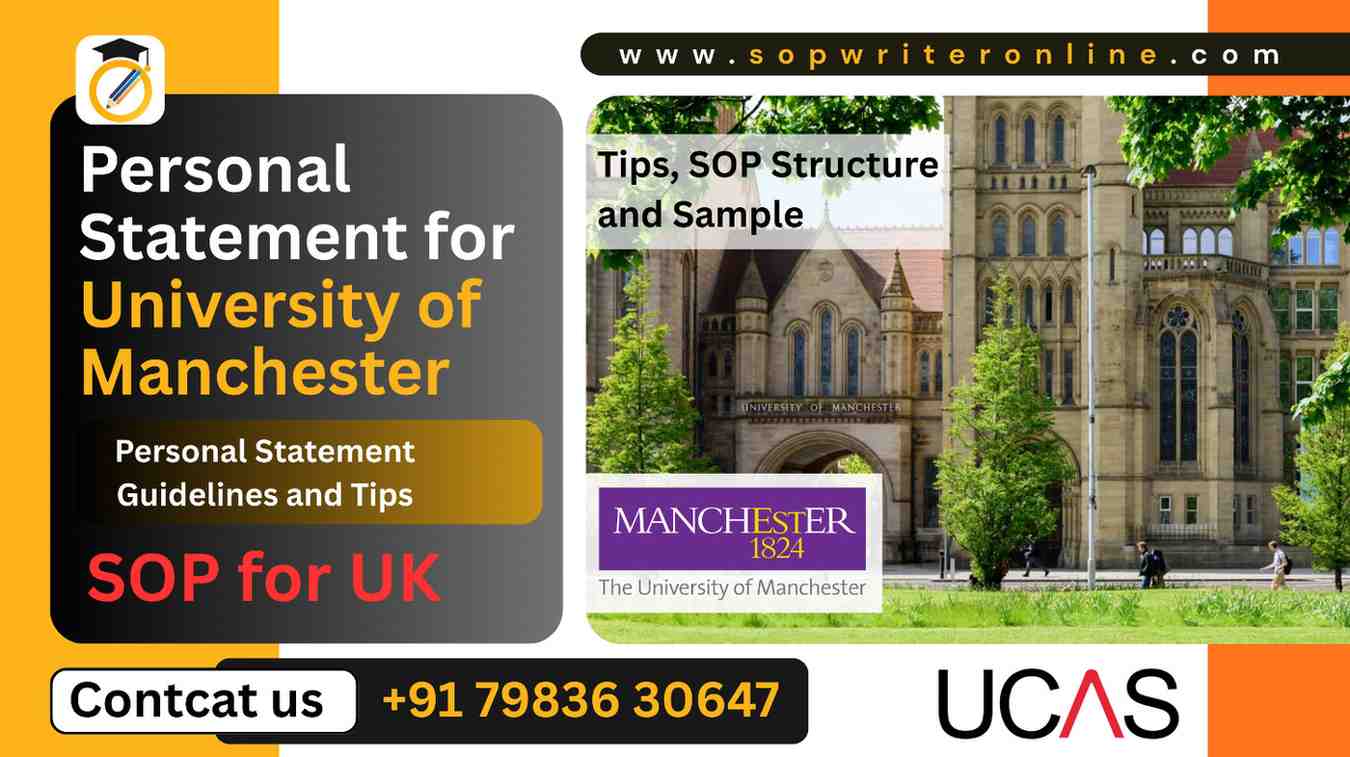
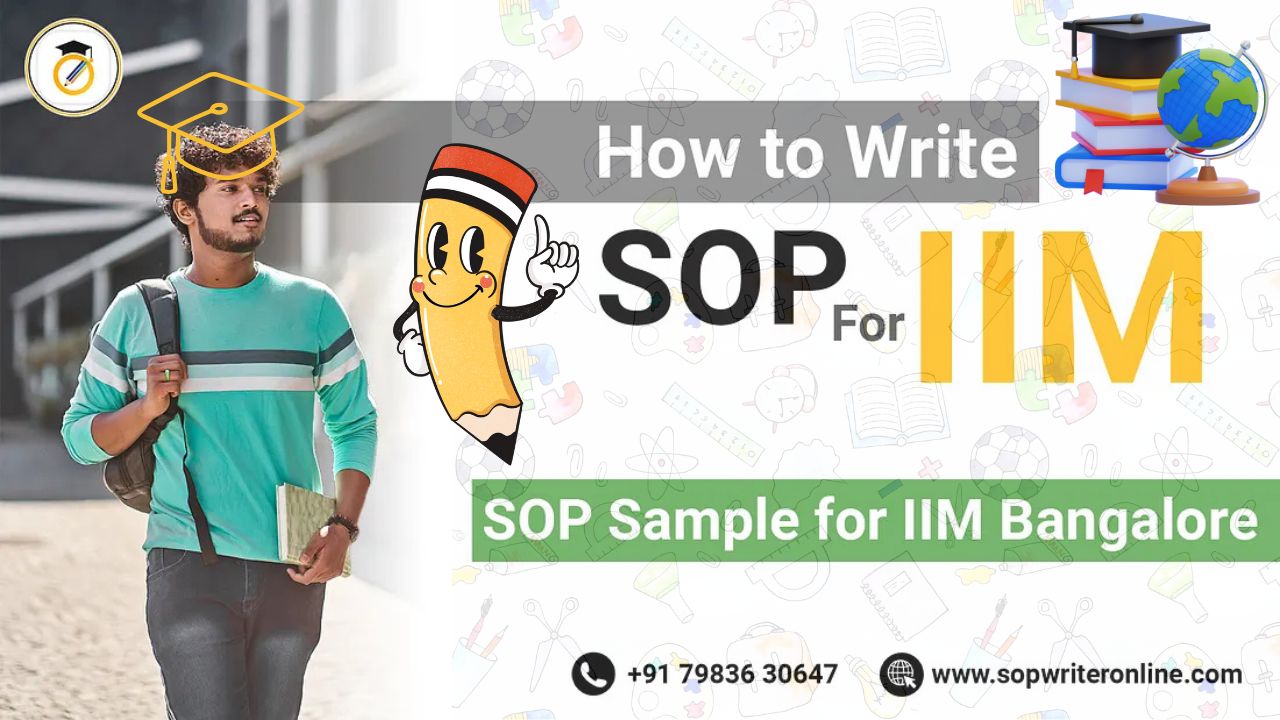

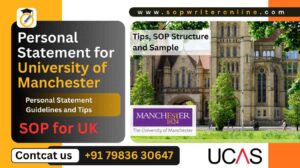

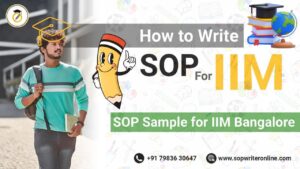



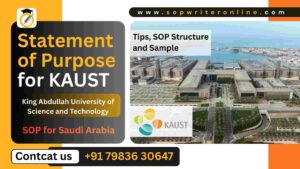


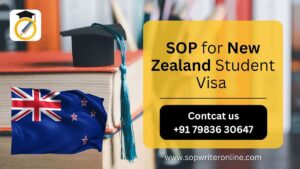
Post Comment